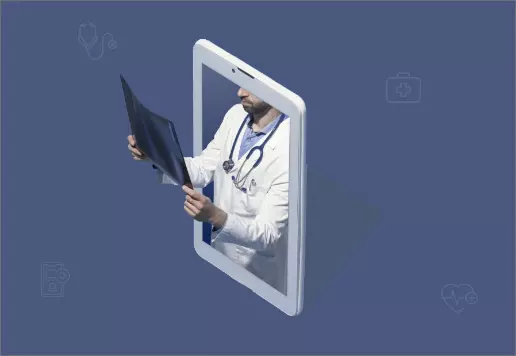The healthtech industry is looking towards a bright future
The Covid-19 pandemic has accelerated the healthtech industry like never before. A new dawn of healthtech innovation is here, with novel technologies aimed to improve the lives of patients and care providers alike, with sophisticated diagnostic tools to intelligent care. Limited access to healthcare providers, inefficiencies in the drug delivery system, andpatient management are all being addressed through tech-infused care.
Let us explore what could be the brightest changes that come about in the future of healthtech.
 The rise of virtual consultations.
The rise of virtual consultations.
The Covid-19 has become the tipping point giving rise to 20% - 30% of the adoption of virtual consultations. A global study by Cisco found that 74% of consumers were ready to get their treatment delivered via telehealth (1).
In the post-Covid era, many providers are joining hands with telehealth technology companies by establishing relationship to bridge the divide in the healthcare landscape. These relationships indicate that more telehealth advancements are going to keep flowing in the future and the services will expand.
Throughout the pandemic, Latlon Technologies has consistently pursued to meet the needs of its clients and customers. By doing so, we have come up with a convenient telehealth solution in India developing a safe and advanced telehealth software named ClinaNG™(https://clina.in/).
 A shift towards cloud-based EHR.
A shift towards cloud-based EHR.
Electronic health records are an ideal solution for streamlining health information and better patient care. The role of EHR is improving in healthcare as alarge number of patients’ data is getting digital and the patients are enabled to access their health records. As more and more patient data is included, the providers need reliable technology to handle this sensitive information instead of loading up the physical servers. So the providers are shifting to cloud servers considering the key benefits like data security & privacy, scalability, advanced search, cost-effectiveness, and faster data exchange. Many healthcare software companies are developing their EHR products in the cloud to keep pace with the industry advancement.
BahaZeiden (CEO, Azalea Health) Predicts:
To prevail under value-based care, the healthcare providers will seek agile EHR solutions that enable them to utilize the intelligence of their patient data to improve outcomes.
On-premises Health IT infrastructure will shift to the cloud. The shift to cloud-based EHR platforms will be directed by the following factors.
- The financial pressures due to the pandemic will drive many providers to reassess the expenditure of managing their IT infrastructure on-premises.
- Additionally, the cloud enables the back-room functions to be done remotely, reducing the risk of Covid-19 exposure for staff and patients. Also, with the rise of ransomware, data breaches and cyber-attack, the providers will look to cloud-based EHR platforms to take the burden of security and compliance off their hands.
- The cloud-based systems will enable providers to access patient data anywhere, enabling telehealth and better care coordination.
 Data analytics & interoperability for public health.
Data analytics & interoperability for public health.
The Covid situation spotlighted interoperability for secure patient data exchange and data analytics in healthcare for better public health. An interoperable healthcare system will significantly improve the response to Covid-19. This helps the clinicians reducing the time spent tracking and segregating the testing reports.
Now that the vaccination is under process, the health system will require strong data analytics and a tracking system to keep pace with the process. The data interoperability between EHR platforms and healthcare systems will be vital to keep track of vaccination across the nation. This will be a crucial factor for the health system to store records if a person moves to another place or change healthcare providers for thesecond dose of vaccination.
New federal interoperability rules were set out to get better access for consumers to their health information but it requires health organisations to bring in new technologies and best data-sharing standards to achieve it.
 AI and machine learning to reduce clinical workload.
AI and machine learning to reduce clinical workload.
The healthcare industry had heard so much about the advances in AI but now, in 2021 and beyond, it will start seeing the impact in their operations that are highly beneficial and scalable.
Out of necessity, the providers are adopting natural language processing for touch-free interactions and seamless transmission of patient's data across the EHR. Also, automated chatbots for diagnosing symptoms will roll out.
HIMSS20 panellists noted that the high-level usage of AI in healthcare will thrive to deliver personalized care. These may involve machine learning and algorithm that used to detect heart disease and cancer accurately; therapy assisted by robots for stroke and virtual assistants that aid with medication reminders.
This is the time for deeptech to come to the fore because there’s a lot of science that is needed in the pandemic. We’ve created vaccines in a short period but artificial intelligence and machine learning can do a lot around supply chains for vaccines, PPE and drugs
- Dr Fiona Pathiraja,
Healthtech Investor, Founder and Managing Partner at Crista Galli Ventures.
 Remote patient monitoring for patient-centred care.
Remote patient monitoring for patient-centred care.
The hospitals and clinics were forced to avoid overcrowding amidst the pandemic. In addition to that, patients, especially with chronic diseases were requested to avoid routine in-person visits to prevent getting infected from the contagious disease. This has led to an increase in the adoption of remote patient monitoring.
Remote patient monitoring will monitor patient biometrics from home to share with the clinicians for better diagnosis. Also, the use of RPM will increase clinical impact for clinics with less staff and enable uninterrupted caregiving during uncertain times.The American Health Association encourages the utilization of RPM in hospitals and clinics for better health management.
 A major shift in the hospital design and cleaning technologies.
A major shift in the hospital design and cleaning technologies.
To maintain sanitary in the hospital premises, healthcare providers are on the lookout for the tools to manage vital tasks like habitual cleaning and implementing good hygiene. The hospitals and clinics are modifying their check-in processes and layouts to avoid the bottleneck and identify contractable visitors before they enter the premises.
Also, the advanced technology tools will be deployed in the hospitals like the following: Autonomous robots that discharge ultraviolet lights to sterilize the rooms in very little time, deploying thermal cameras at the entrance to automatically detect body temperature of the visitors and implementing RFID technology to oversee how frequently the hospital staffs are washing their hands.
The hospital building design transformation has become a necessity in the pandemic situation. The design changes will include convertible spaces to lodge the critical care patients, plastic walls or transparent glasses will be implemented to view infected patients, installation of touch screen kiosks and buzzers to avoid clustering.
 Wearable technology in delivering genuine value
Wearable technology in delivering genuine value
Wearable technology is beyond a fashion trend now. From smartwatches to other wellness devices, technology plays a major role in providing exclusive and real-time data. Apart from smartwatches, fertility tracking, sleep tracking and biomarker monitoring devices are put to habitual use. Wearable technology has become a catalyzer that provides valuable insights about the patient for better treatments.
This will get far in preventing or offering treatment for chronic diseases providing personalized care. These data extracted from wearable devices are not only helpful for providing treatment but also for the researchers which can be used under privacy restrictions. The healthcare technology companies in India are now focusing on producing wearable devices with greater accuracy to track advanced biometrics.
 The pandemic as a propellant for healthtech
The pandemic as a propellant for healthtech
The Covid-19 scenario has blown away the barriers blocking the way for the adoption of digital healthcare. These rapid developments, though exciting, will challenge healthcare IT solution providers in deploying the latest technologies into their healthcare solutions. The outgrowth of these technologies will bring desirable effect in the future of humanity.
As a leading provider of technology solutions and cloud services for healthcare, we have unlocked the digital capabilities for our clients across the globe who are seeing better outcomes in partnership with us.Get in touch with us if you require any healthcare IT solutions. Let us take the technology barrier out of your way.
Reference:
https://inc42.com/resources/healthtech-trends-2021-a-transition-in-making-for-the-industry/ GO
More Blogs

24th August, 2021
The healthtech industry is looking towards a bright future
The Covid-19 pandemic has accelerated the healthtech industry
Read More
3rd August, 2021
Python for the better future of Healthcare
In a regular scenario, the tech industry will announce a blockbuster
Read More
13th July, 2021
Telehealth is now a new normal for healthcare
For many industries, predominantly healthcare
Read More